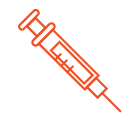
If you are a medical student, you will be spending at least three years as an intern when you graduate (and eight years if you are studying to become a neurosurgeon). All this time, you’ll be considered a physician in training, so you will only be able to practice under supervision.
But before that, as an undergraduate student, you can participate in various pre-med internships. They are usually offered in non-clinical positions in different healthcare and medical departments during summer holidays and provide an opportunity to investigate your interests and try yourself in various spheres such as doing research, keeping medical records, scheduling appointments, volunteering in the ER, and so much more. Let’s take a look at what summer opportunities you may consider.
Summer Internship Opportunities for Pre-med Students
Pre-med summer internships are offered by various health care institutions, nonprofit organizations, and different businesses. Most popular among them are research programs, positions in public health departments, and intern roles in global health projects.
 Research Intern
Research Intern
Many pre-med students are eager to participate in some research work under industry professionals to gain experience and knowledge in the medical field they are interested in. You can either go on with the research project you were doing in your school lab or choose to work with a different project, for instance, run by a local university or company. Being a research intern will allow you to get insight into various types of research: basic science, clinical, public health, and health policy research. If you are hesitating between health care and computer science majors, you can participate in a research program that focuses on digital health and AI and see what interests you most.
 Public Health Intern
Public Health Intern
If you want to get hands-on experience, you can look for opportunities at the National Health Institute (NIH) and Centers for Disease Control (CDC), state health care departments, your local hospitals, or community-based agencies (e.g., local health departments, hospitals, and rural health clinics). Usually, these institutions offer pre-med students to participate in programs related to or address social determinants of health (SDOH), community health, health education, and policy issues.
 Clinical Intern
Clinical Intern
You can also consider becoming a clinical intern who works under the supervision of a professional physician. Look for the positions offered in your local hospital or clinic.
 Medical Scribe
Medical Scribe
Another option that some undergraduate students choose for their summer internship is to become a medical scribe. Basically, your job will be to assist a physician, perform documentation, gather information on patients and so much more. It is a great opportunity to understand whether you are good at handling administrative work and documentation.
 Laboratory Assistant
Laboratory Assistant
If working with people is not your calling but medicine fascinates you as a science, you can spend your summer internship as a laboratory assistant. Here, your task will include doing research, conducting tests, and analyzing results.
Nonprofit Intern
A great number of nonprofit organizations provide internship opportunities in medical-related fields. While they may not be directly from healthcare institutions, you can enroll in one of such internships to improve your leadership skills or learn about grant writing and fundraising. In such organizations, you’ll have plenty of freedom to take initiative and try new approaches.
Intern in a Large Company
One more opportunity to spend your summer as an intern is to apply for one of the large pharmaceutical companies. Depending on your sphere of interest, you can learn a great deal—from marketing to research. One of the benefits of working in a corporation is that such internships are often paid. Alternatively, you can try applying to a biotech startup or a company that focuses on innovation in medical and health care.
Global Health Project Intern
If spending a summer abroad sounds good to you, we suggest you apply to one of the global health nonprofits. There are plenty of internship positions available both in Europe and Asia as well as other parts of the world for those who can afford such a trip, speak a foreign language, and are willing to learn about other health care systems outside the U.S. Usually, such internships are advertised in universities.
Medical Internship Examples
 Summer Internship Program / John Hopkins University
Summer Internship Program / John Hopkins University
Duration: 10 weeks
Stipend: $3,000
Housing: Provided at no cost to participants
The Summer Internship Program (SIP) at John Hopkins University provides students from various backgrounds with an opportunity to participate in biomedical and/or public health research. Those who plan to pursue a career in medicine and public health are free to apply. Interns will be able to get exceptional theoretical knowledge and have a chance to use their practical skills in research, scientific experimentation, and other fields. All students will have a mentor who is either a faculty or research lab member. At the end of the program, students will be asked to present their research results and share feedback. They are also free to present the research at conferences.
 Summer STAR Program / Augusta University
Summer STAR Program / Augusta University
Duration: 9 weeks
Stipend: $4,500 (before taxes)
Housing: Paid by participants
The Summer STAR (Student Training And Research) Program at Augusta University offers “highly motivated and talented” undergraduate students to develop their skills in scientific and biomedical research. Every STAR intern will be matched to a biomedical research laboratory and have a mentor (one of the Augusta University faculty or lab team members). Students who plan to pursue a PhD or MD/PhD in biomedical sciences should definitely consider this internship.
 Summer Clinical Internship Program / Robert Wood Johnson Medical School / Rutgers University
Summer Clinical Internship Program / Robert Wood Johnson Medical School / Rutgers University
Duration: 6 weeks
The Summer Clinical Internship Program (SCIP) at Robert Wood Johnson Medical School is an internship opportunity for undergraduate and post-baccalaureate students pursuing careers in medicine. The program takes place in New Brunswick, New Jersey, and presupposes that students shadow clinical faculty members from the speciality of their interest. It’s a full-time internship where students can get hands-on experience by following and assisting clinicians during their working hours. Such immersion is the surest way to gain insights into the issues of inpatient care and all aspects of medical practice. ![]()
The full list of Summer Undergraduate Research Programs for medical students can be checked on the website of the Association of American Medical Colleges .
![]()
The Bottom Line
Pre-medical and undergraduate students interested in a career in healthcare and medical fields are strongly advised to use summer internship opportunities provided by universities, public health and medical facilities, private and nonprofit organizations. Becoming an intern is the surest way to understand what medical field is most suitable and appealing for you, test your knowledge, and enhance practical skills. In our blog, we’ve already written about internship platforms and how to better use them. Now that you know more about medical internship opportunities specifically, we encourage you to make the most of them! BTW, it’s a great alternative to summer jobs for college students.






